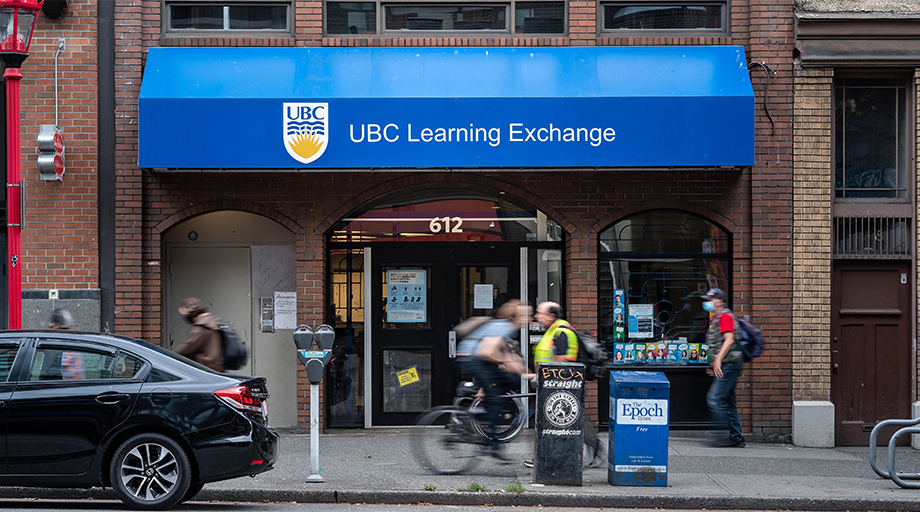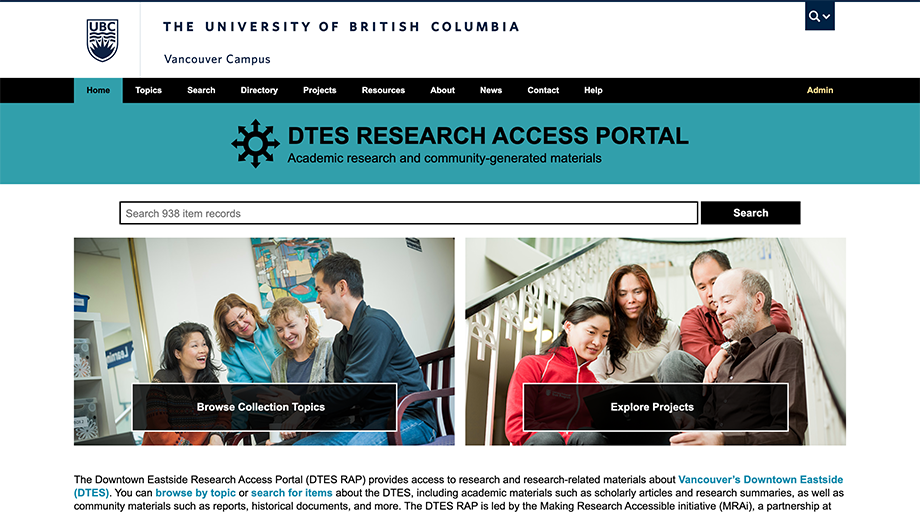
Photo credit: Paul Joseph, UBC Brand and Marketing.
Community members living in Vancouver’s Downtown Eastside (DTES) have been the focal point of countless scholarly research studies and surveys over the years. Up until recently, this research has remained largely out of reach to participants and community organizations, locked away in journals and other databases that require paid subscriptions to access. Community members have said they would benefit from access to that data for evaluating program and service effectiveness, for example, or for grant writing.
The recently launched Downtown Eastside Research Access Portal (DTES RAP), a project led by the UBC Learning Exchange in partnership with UBC Library’s Irving K. Barber Learning Centre, is designed to change that.
The DTES RAP provides access to research and research-related materials relevant to Vancouver’s Downtown Eastside through an easy-to-use public interface. The portal was developed in consultation with DTES residents and community organizations through focus groups and user experience testing, and in collaboration with a number of university units.
“I’ve noticed how people’s eyes light up when I talk about this project – it resonates with so many different people at the university and in the community,” says Angela Towle, Academic Director of the UBC Learning Exchange.
For members of the UBC community, the DTES RAP serves a variety of purposes. As an instructional tool that uses open-access resources, the DTES RAP can be used by librarians in reference work and supporting class assignments. Researchers will find the portal useful in amplifying the reach and impact of their work and, with support from the DTES RAP team, in meeting open access requirements. The portal can also help minimize demands on community time from researchers undertaking new research projects within the DTES by providing a reliable, primary information source. For students interested in learning more about the DTES community, the portal is an excellent first stop to enable proactive learning.

The DTES RAP website homepage.
The DTES RAP makes innovative use of UBC’s open access digital repository, cIRcle, in the back-end and relies on cIRcle’s infrastructure and services for content processing and reuse permissions. Currently, 50% of the total items in the DTES RAP comes from cIRcle. Through the UBC Co-op program, each term a student librarian is hired to scour cIRcle for relevant content and tag it to appear in the DTES RAP. Student librarians also contact authors who have copyright to relevant materials and offer to work with them to add those materials to cIRcle. However, the DTES RAP also curates relevant external materials and provides links to those items in their originally published locations. These records can include descriptions of items that cannot be archived in cIRcle because of copyright issues whereby full text is not available.
“We want these items to come up in our DTES RAP search results so that people know the materials exist,” explains Aleha McCauley, project lead for the DTES RAP and Community Engagement Librarian at UBC Library’s Irving K. Barber Learning Centre. The DTES RAP describes these kinds of items as “Restricted Use” but also offers help in accessing those items via a button that appears next to inaccessible items. “We also include forms of public scholarship such as clear language summaries, in an effort to respond to community feedback that there was a need for alternate forms of research aside from the traditional article,” says McCauley.
“This project takes a nuanced approach to open access that recognizes that providing public links to academic articles is not enough,” says Towle. “We are exploring different ways to address these barriers including help materials, different genres and formats, workshops, outreach and a researcher directory.”
To support access, the Learning Exchange and UBC Library hired Nick Ubels to pilot a unique new role in the Learning Exchange. Ubels offers one-on-one support, along with workshops and demonstrations of the DTES RAP in action to bridge that gap.
“As we continue in this work, we’re constantly learning more about how best to meet community information needs,” says Ubels.
The DTES RAP was created as part of the Making Research Accessible Initiative (MRAi), a sustained collaboration that kicked off in 2015 between the UBC Learning Exchange and UBC Library’s Irving K. Barber Learning Centre, and has been guided by a steering committee that includes the UBC Office of Community Engagement, the UBC Knowledge Exchange Unit, the UBC School of Library, Archival, and Information Studies (iSchool), Simon Fraser University Library, and the Vancouver Public Library.
Visit the DTES RAP to start exploring, and subscribe to the newsletter for updates about this project and ways to participate in its development.
For more information about workshops, demonstrations or one-on-one user support for DTES RAP, contact Nick Ubels (nick.ubels@ubc.ca).